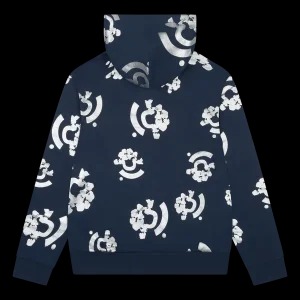Denim Tears Clothing: A Cultural Statement Woven in Fabric
In the world of fashion, where brands rise and fall with trends, Denim Tears stands apart. Founded by Tremaine Emory in 2019, Denim Tears is more than a clothing label—it is a cultural and political statement embedded in the very fabric of its garments. Drawing from deep roots in African American history, the brand uses clothing as a canvas to tell stories of struggle, resilience, and identity. From the iconic Denim Tears hoodie to the symbolic Denim Tears shirt, each piece serves as both fashion and philosophy, making a profound statement about heritage, memory, and expression.
Origins and Vision
Tremaine Emory, the creative force behind Denim Tears, launched the brand as a way to address the overlooked narratives of Black Americans. Emory, who has worked with Kanye West, Frank Ocean, and Virgil Abloh, channels his experiences and activism into a brand that prioritizes storytelling over spectacle. The name “Denim Tears” itself is emotionally charged—it represents sorrow, labor, and the painful history of Black lives in America, particularly during slavery and segregation.
The brand’s debut collection was released in 2019 to mark the 400th anniversary of the first enslaved Africans arriving in Jamestown, Virginia. Emory chose cotton—the material most associated with American slavery—as the foundational fabric. He recontextualized it, using cotton wreaths in his designs as a stark reminder of what Black bodies endured and what they have overcome.
Iconic Pieces: The Denim Tears Hoodie and Shirt
Among the brand’s most recognizable pieces is the Denim Tears hoodie. Often made in collaboration with other powerhouse labels like Champion and Levi’s, these hoodies are not your average streetwear staples. The designs frequently incorporate the brand’s signature cotton wreath emblem or powerful graphics that reference African American culture and historical pain. Whether in a simple gray fleece or adorned with bold red and green hues referencing Pan-Africanism, the Denim Tears hoodie is both a fashion statement and a badge of awareness.
The Denim Tears shirt follows the same narrative thread. These shirts, often featuring thought-provoking imagery, quotes, or Emory’s cotton motif, encourage viewers to think critically about history. For instance, some T-shirts include prints of historic photographs, slogans about justice and equality, or artworks from notable Black creatives. They blur the line between fashion and protest, offering wearers a platform to engage in social commentary without saying a word.
Cultural Collaboration and Influence
Denim Tears has collaborated with major names in the fashion world, further amplifying its reach and message. Emory’s partnership with Levi’s, for example, produced a line of jeans, jackets, and tops embroidered with cotton wreaths, a subtle yet profound symbol of historical reflection. These collaborations have helped to position Denim Tears not just as a streetwear label, but as a brand at the intersection of fashion and activism.
Emory’s collaborations are never superficial; they are grounded in shared values. For instance, when he teamed up with Dior’s Kim Jones, the focus was not on chasing hype, but on expanding the brand’s narrative power to global audiences. In each collaboration, the Denim Tears hoodie and Denim Tears shirt serve as vessels for deeper cultural storytelling, bringing Black history into the spotlight in spaces where it’s often ignored or misrepresented.
A Symbol of Black Identity
Denim Tears stands for more than fashion—it stands for Black identity, resistance, and pride. By choosing clothing as the medium, Emory ensures that these messages reach broad, diverse audiences. Wearing a Denim Tears hoodie is not just about comfort or style; it’s about embodying a legacy of resistance and hope. It’s a form of wearable protest, an homage to those who came before, and a commitment to a better future.
This conscious approach to fashion resonates particularly with younger generations, who are increasingly seeking authenticity and meaning in the brands they support. In this sense, Denim Tears is perfectly positioned—it offers quality garments with layered significance, elevating everyday wear to the level of cultural discourse.
Fashion as Protest
In an industry often criticized for being detached from real-world issues, Denim Tears sets a powerful example. It reminds us that fashion doesn’t have to be apolitical. It can confront injustice, challenge dominant narratives, and educate. By using clothing to explore themes like systemic racism, cultural erasure, and historical trauma, Emory challenges consumers to reconsider what fashion can do.
The popularity of the Denim Tears hoodie and Denim Tears shirt demonstrates how effective this strategy has been. These aren’t just popular because of celebrity endorsements or social media buzz. They resonate because they are real, thoughtful, and urgent. Every stitch in a Denim Tears garment carries meaning, and that’s something no trend can outshine.
Conclusion
Denim Tears is a brand that reshapes the very concept of fashion. With its roots deeply planted in history and activism, it uses garments to narrate the African American experience in ways that are both visually striking and emotionally resonant. Whether it’s a Denim Tears hoodie worn on the streets or a Denim Tears shirt seen on a stage, each piece contributes to a larger conversation about identity, history, and the future.
As Tremaine Emory continues to evolve the brand, Denim Tears remains a testament to the power of fashion as a force for cultural change. It proves that clothes can do more than dress the body—they can awaken the mind.









